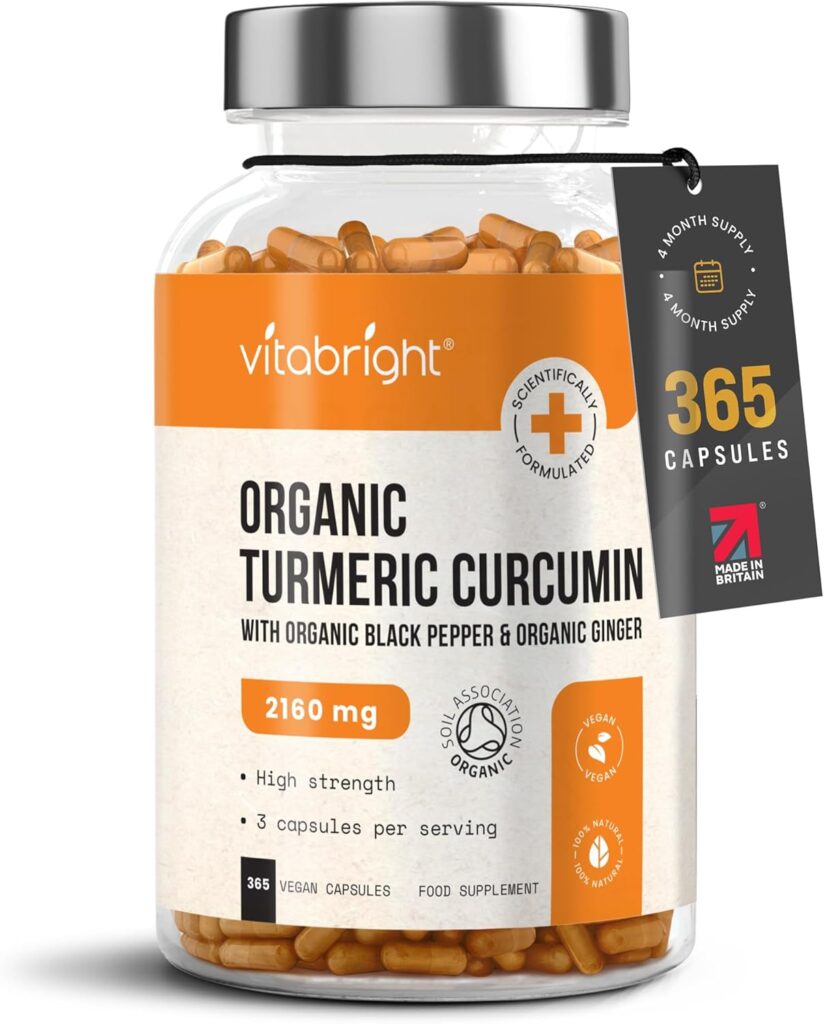Turmeric: The Yellow Spice with Special Powers
Turmeric is a vibrant yellow spice that you probably know best from curry powder. It comes from the roots of a plant called Curcuma longa, which grows mostly in Southern Asia. For centuries, people haven’t just used turmeric to add flavour and colour to food; they’ve also used it in traditional medicine for general health and to treat many conditions.
You might avoid traditional pain killers, such as paracetamol due to side effects with Gilbert’s Syndrome, or aspirin or ibuprofen due to stomach sensitivity. Turmeric can be a natural solution to dealing with pain from conditions like arthritis.
But could it cause problems in the liver? Recent research uncovers some issues. Here’s what you need to know about turmeric, liver toxicity and Gilbert’s Syndrome.
What is Turmeric and What’s Inside It?
The Basics of the Spice
Turmeric is a popular botanical product (meaning it comes from a plant) that is part of the ginger family. It has a bright yellow color and a strong, distinct taste.
Curcumin: The Super Ingredient
The most important active parts of turmeric are chemicals called curcuminoids. The main one is curcumin. These curcuminoids are what scientists believe give turmeric its special powers.
- Anti-inflammatory: This means it helps calm down swelling and irritation in the body.
- Antioxidant: This means it helps protect your body’s cells from damage.
Traditional Uses
In traditional Indian medicine, called Ayurvedic medicine, people have used turmeric to treat things like:
- Indigestion (upset stomach)
- Upper respiratory infections (colds and coughs)
- Liver diseases
Today, scientists are actively studying curcumin to see if it can help with a wider range of conditions, like diabetes and certain liver problems. However, it’s important to know that rigorous proof of its effectiveness in treating serious medical conditions is needed.
Turmeric’s Safety: A Closer Look
For a long time, turmeric was thought to be very safe, even at high doses. However, recently, some concerns about its effect on the liver have come up. This might worry you if you have a liver condition like Gilbert’s Syndrome and you are taking, or thinking about taking turmeric.
Liver Injury and Turmeric
The liver is one of the hardest-working organs in your body. It cleans your blood, helps with digestion, and stores energy. Most people who take turmeric supplements have no problems. However, there have been reports of people developing acute liver injury (a sudden, severe problem with the liver) after taking turmeric or curcumin products.
Why is this Happening Now?
One reason why liver problems might be showing up now has to do with how the body uses curcumin. Normally, curcumin is poorly absorbed by your body when you swallow it. That means most of it just passes through you, and only a tiny bit gets into your bloodstream.
To make the product more effective, some supplement makers found ways to make curcumin highly bioavailable. This means they added ingredients like piperine (from black pepper) to help the body absorb a lot more curcumin.
- The Link: These high-bioavailability forms of purified curcumin are the ones that have been connected to many of the recent cases of liver injury.
What Liver Injury Looks Like
When people get liver injury from turmeric, the symptoms usually start 1 to 4 months after they begin taking the supplement. The onset is usually gradual:
- Early Symptoms: Feeling very tired, sick to your stomach, and having a poor appetite.
- Later Symptoms: Jaundice (when your skin and eyes turn yellow) and dark urine.
How Doctors Treat It
The most important step is to stop taking the turmeric product immediately. In most cases, the liver starts to get better quickly once the supplement is stopped. However, in very severe cases, the injury can be serious. This may lead to the need for a liver transplant or, sadly, even death. This is why it’s so important to stop taking it as soon as any symptoms of liver problems appear.
The Science Behind the Harm
Scientists have been trying to figure out why turmeric causes liver injury in some people but not in others. They believe it is an idiosyncratic injury, which means it’s an unpredictable reaction that depends on the individual person.
The Genetic Link
Researchers found a strong connection between turmeric-related liver injury and a specific gene marker called HLA-B*35:01.
- This gene marker is linked to the immune system.
- It suggests that in people with this marker, the immune system might overreact to the curcumin, causing damage to the liver cells.
This same gene marker has also been linked to liver injury from other popular herbal products, such as green tea extract. Read more about Gilbert’s Syndrome and caffeine, including green tea here.
Could having Gilbert’s Syndrome mean you process turmeric less well?
What’s the story with Gilbert’s Syndrome, turmeric and liver toxicity? There is no direct, established link proving that Gilbert’s Syndrome increases the risk of the rare, acute liver injury from turmeric/curcumin. However, the functions of the UGT1A1 gene and mechanisms of curcumin metabolism suggest a potential interaction relevant to how your body handles the supplement.
Here is a summary of the connection points:
1. The Role of UGT1A1 and Gilbert’s Syndrome
- UGT1A1 Gene: This gene produces the enzyme UDP-glucuronosyltransferase 1A1 (UGT1A1). This enzyme’s main job in the liver is a process called glucuronidation.
- Glucuronidation: This is a key detoxification pathway where the liver attaches a substance (glucuronic acid) to toxic or waste products (like bilirubin) and certain drugs, making them water-soluble so they can be easily excreted from the body via bile or urine.
- Gilbert’s Syndrome (GS): This is a common genetic condition where a mutation in the UGT1A1 gene reduces the activity of the UGT1A1 enzyme by about 30% to 50%.
- Result: The body is less efficient at processing unconjugated bilirubin, leading to slightly elevated levels of bilirubin in the blood, which can cause mild, intermittent jaundice (yellowing of the skin/eyes), especially during stress or fasting.
- Relevance: People with GS have a reduced capacity to detoxify certain compounds that rely on UGT1A1 for clearance.
Read more about what Gilbert’s Syndrome is here.
2. Curcumin and UGT1A1 Interaction
- Curcumin Metabolism: Curcumin (the active ingredient in turmeric) is primarily metabolized and cleared from the body through glucuronidation by UGT enzymes, including UGT1A1.
- Curcumin’s Effect on UGT1A1 (Inhibition/Induction): Studies (mostly in laboratory settings) suggest that curcumin can interact with UGT enzymes in two different ways:
- Inhibition: Curcuminoids can directly inhibit the activity of UGT enzymes, which slows down the detoxification process for other compounds that use the same pathway.
- Induction: Curcumin may also increase the expression of the UGT1A1 gene (meaning it tells the body to make more of the enzyme over time).
Conclusion on the Link
The known liver injury from turmeric/curcumin is classified as idiosyncratic drug-induced liver injury (DILI), which is an unpredictable reaction. The strongest known risk factor for this injury is a specific immune-system gene marker called HLA-B*35:01, suggesting the liver damage is often related to the immune system, not just metabolism.
However, a person with Gilbert’s Syndrome already has a reduced capacity to process curcumin (and its metabolites) due to the low UGT1A1 activity.
Therefore:
- Theoretical Risk: It is theoretically plausible that in a person with Gilbert’s Syndrome, a high dose of curcumin (especially the high-bioavailability kind, which increases the amount of curcumin the liver must process) could lead to a greater build-up of curcumin or its toxic metabolites, which could stress the liver.
- Clinical Evidence: Despite the theoretical metabolic link, no robust clinical data has confirmed that having Gilbert’s Syndrome is a primary or strong risk factor for turmeric-induced liver failure. The rare, acute injury from turmeric seems to be mainly related to an immune reaction (HLA-B*35:01), which is separate from the UGT1A1 deficiency in Gilbert’s Syndrome.
In short, while UGT1A1 is involved in both Gilbert’s Syndrome and curcumin processing, severe liver injury from turmeric is thought to be an immune-mediated problem, not simply a metabolic overload that would primarily affect someone with GS.
If you do want to take turmeric and avoid other pain killers, or for its other benefits, here’s the supplement that I take. It has helped me avoid paracetamol, ibuprofen and aspirin.

Important Things to Remember
- Turmeric is a Spice AND a Supplement: Turmeric used in food is usually safe. The problems are mostly linked to highly concentrated supplements of curcumin.
- It’s Rare, But Serious: Even though liver injury from turmeric is rare (about 1 in every 10,000 to 100,000 people who take it), it can be very serious.
- The High-Power Problem: Be cautious of supplements that claim to have very high absorption or “bioavailability,” as these are the ones most often connected to the liver issues.
- Listen to Your Body: If you ever take a turmeric or curcumin supplement and start feeling very tired, sick, or notice your skin or eyes turning yellow, stop taking the supplement right away and tell a parent or doctor. Talk to your doctor before starting a new supplement especially if you are on other medication.
Sources and further reading:





